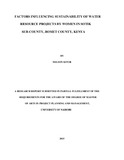| dc.description.abstract | The demand for water as a natural resource is high and need to be sustaining so that the current
generation can use and can still meet the need of the future generation. Consequently, this study
explores the factors influencing sustainability of water resource project by women. The study
will be carried out at Sotik Sub-County, Bomet County, Kenya. It hopes to solve the problem of
water in the area by empowering women who are the key users of the resource. This study were
guided by the following objectives; to establish the influence of leadership on sustainability of
water resource projects, to determine the extent to which women involvement influence
sustainability of water resource projects, to examine the influences of training on sustainability
of water resource projects, Lastly, to determine the extent to which availability of funds
influence sustainability of water resource projects. The finding of the study will be useful to the
entire community especially women who use this resource often. Also it will be helpful in
underscoring the clean and sustainable water for the community- the people of, Sotik SubCounty,
Bomet County. Development is possible when women who are the majority and key
users of this water resource are empower and allowed to make crucial decision concerning the
water projects. While women often have the primary responsibility for the management of
household water supply, they are rarely consulted or involved in the planning and management
of this vital resource. In Sub-Saharan Africa women produce upto 80 percent of basic foodstuffs,
yet they have the least access to means of production. Literature review reflects the influence of
leadership on the sustainability water resource projects, assess the involvement of women in
sustainable water resource, examine the influence of training on sustainability of water resource
and determine the extent on which availability of funds influence sustainability of water resource
projects. The target population will be 384 people and descriptive research design will be used in
collecting the data from the respondent. According to Kothari (2008) questionnaires are more
objective than interviews and are standardized. Respect of the respondent is essential and when
administering the questionnaire need to be observe and this encourage the respondent to give
freely there view. The theory informing this study is Maslow Hierarch of human; the lower is
physiological needs that are food, water, clothes and shelter. The basic level need is Maslow’s
Hierarchy of Needs Theory. Physiological, safety and social needs are referred to as lower order
or deficiency needs, because the absence of them make individuals deficient and existence as a
human being is threatened. From the study it was noted that good leadership influence
sustainability of water projects. Majority of the respondents are illiterate and this affects the
sustainability of water projects. Further in order to achieve sustainable water women should be
involved during conception, design, implementation, operation and maintenance of the projects.
Also the study found out that funds are not adequate and the mode of disbursement is not
reliable, transparent and fast and this hinder management of the water projects. When funds are
enough and the affected communities contribute the available resource the project will be
sustains and funds distribution should be clear. | en_US |

